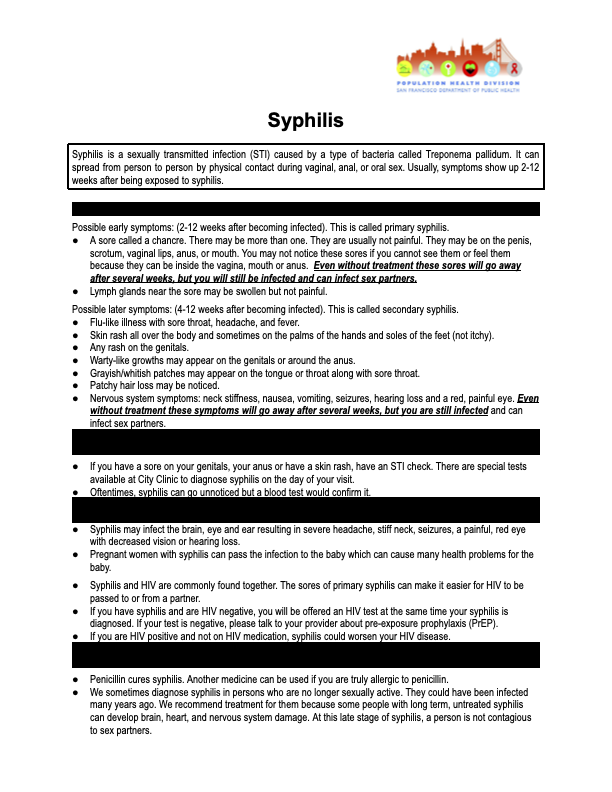The first symptoms usually show up in the first 12 weeks after becoming infected. Syphilis infection has four stages: primary, secondary, latent, and tertiary (late).
1) Primary syphilis: 1-12 weeks
The first sign of primary syphilis is often a skin sore called a chancre (shank-er). Chancres can appear on your penis, scrotum, vaginal lips, butt, or in your mouth. They are usually not painful. You may have more than one, or you may have chancres and not notice them because they are inside your anus, vagina, or mouth.
Chancres go away after several weeks even without treatment, but you will still be infected and can spread syphilis to sex partners.
2) Secondary syphilis: 1–6 months
About 25% of people with untreated syphilis will develop one or more of these symptoms, one to six months after becoming infected:
- Flu-like illness with sore throat, headache, fever and fatigue
- Skin rash that appears on your genitals, neck, torso and sometimes on palms of hands and soles of feet; usually the rash is not itchy
- Wart-like growths (condylomata lata) may appear on your genitals or around your anus
- Grayish or whitish patches on your tongue or throat
- Patchy hair loss
Secondary syphilis symptoms usually last anywhere from one to three months, but sometimes they last longer, or come and go over a year or two. Even without treatment these symptoms will go away, but you are still infected and can spread syphilis to sex partners.
3) Latent syphilis
Latent syphilis is when a person is infected but has no symptoms. The infection can be detected only by a blood test. If not treated, latent syphilis continues for life. Many people with latent syphilis never have serious problems, but some progress to the final stage, called tertiary syphilis.
4) Tertiary (late) syphilis: 1+ year
About 33% of people with untreated syphilis experience serious damage to various organs and body systems. Tertiary syphilis can appear any time from a year to 50 years after becoming infected; most cases occur within 20 years. The brain, heart, liver, and bones are the most commonly involved organs. Tertiary syphilis can cause paralysis, mental problems, blindness, deafness, heart failure, and death.
Neurologic syphilis means the syphilis bacteria has entered your nervous system.
This is very dangerous and can happen during any stage, even very early after infection. Symptoms of neurologic syphilis include:
- Vision changes
- Red and/or a painful eye
- Difficulty looking at light
- Ringing in the ear
- Hearing changes
- Neck pain and stiffness
- Nausea or vomiting
- Seizures
Congenital syphilis is passed from pregnant mother to baby.
Syphilis can be passed from an infected mother to her baby during pregnancy or childbirth. If the mother is not treated, congenital syphilis can lead to serious health problems for the baby, including death.
All pregnant women should get tested for syphilis at their first prenatal care visit, and again in the third trimester and at delivery if there is a chance she became infected with syphilis during pregnancy. In places with high rates of syphilis in women, the state or local health department may recommend that all pregnant women get tested for syphilis three times during pregnancy, because it can be difficult to know who is at risk. If you are pregnant and concerned about syphilis, talk to your healthcare provider or call San Francisco City Clinic at 628-217-6600.

